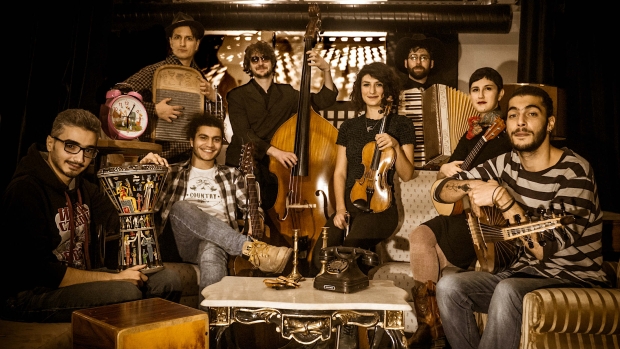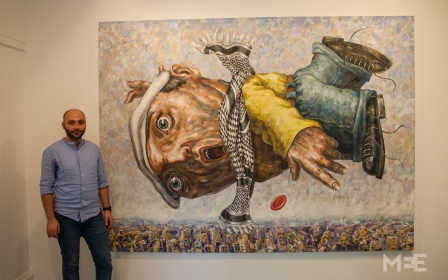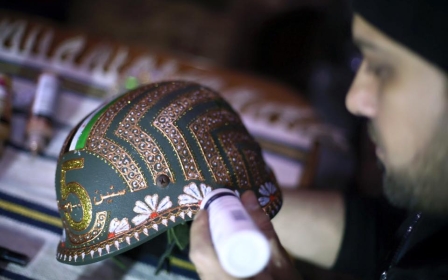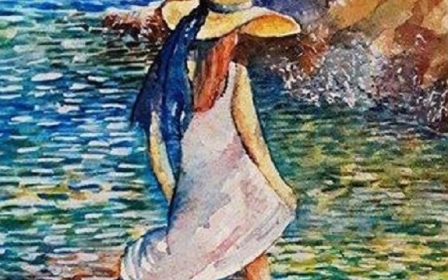Country music got Syrian soul: Istanbul's new refugee music scene
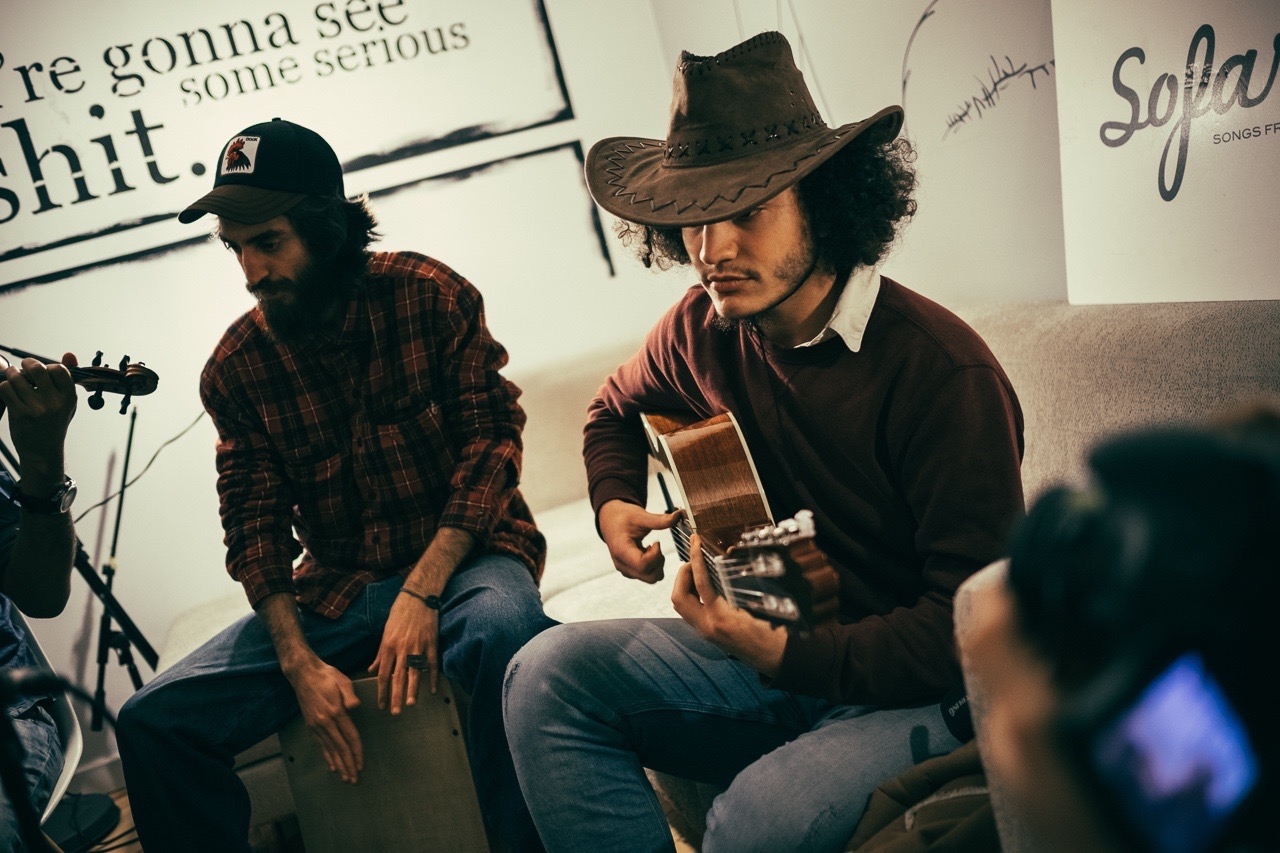
ISTANBUL, Turkey - After fleeing war in his home country, and fending off pirates on an ultimately failed boat journey to Europe, Syrian refugee Bashar Balleh has now found a home in country music, in the perhaps unlikely setting of Istanbul.
Multi-instrumentalist Balleh, now based in Turkey, was one of over a million people who attempted the sea crossing from Turkey to Greece in the summer of 2015 - many continue to lose their lives on the same route.
Growing up in Latakia, on Syria's coast, Balleh left for Turkey on Christmas Day of 2014, on a student visa.
Due to security concerns for his family, Balleh does not want to discuss Syria or his experiences there, but he will say that he came to Turkey as a student, and has stayed on as a refugee.
Since then, the bright-eyed 24-year-old has made a life for himself in Istanbul’s eclectic music scene. In his cosy apartment in the city’s alternative hub of Kadikoy, he shares his story and how it resulted, ultimately, in the formation of Istanbul’s first country and western/Arab/Turkish-fusion band dedicated to supporting refugees, Country for Syria.
Blending the oud, violin, accordion, guitar, ukulele, trumpet, cajon, darbuka and bass alongside Arabic, Turkish and English lyrics, Country for Syria has performed more than 75 concerts since their founding in December of 2015.
“We have also performed a number of benefit shows for various organisations,” Balleh said.
This past February the group released a song and video protesting US President Donald Trump’s first travel ban, a vehicle for those members of the group impacted by the ban to tell their stories.
Aside from Balleh, two other band members are also Syrian refugees and a fourth is Kurdish, displaced from southeastern Turkey, which Kurds refer to as Bakure, or Turkish Kurdistan.
Balleh sits on the couch next to his curly-haired band mate Owen Harris, originally from the United States. Across the room an electric piano, a beautifully crafted cello and two guitars are arranged along the wall - all instruments Balleh is fluent in. A few other friends have gathered as they prepare to record.
Harris and Balleh are both working for an NGO called Humanwire, which uses social media to raise money and resources for individual refugees and their families.
Collecting money in cowboy hats
“At most of our shows, we pass the cowboy hat around to collect money for a different refugee family that we work with through Humanwire," Owen tells MEE, one of the many refugee support projects that the band works with.
“That way we have helped about 60 families," he adds.
When the band formed, Harris was preparing to travel to southeastern Turkey with Clowns Without Borders to perform for children in refugee camps and villages.
“One time we were performing in a public square in Dargecit village in Mardin,” Owen says. “And the Turkish military came up with three tanks. They took our passports and everything, to check if we were Iraqi or Syrian. Strangely, [they] let us keep performing. So we performed there surrounded by all these tanks, dressed as clowns.”
The Turkish military made it clear that they were walking a thin line, he says.
“They literally told our Kurdish friends ‘if these foreigners weren’t here you would all disappear',” Harris adds.
He would pen his parts to Country for Syria’s Brave As A Pigeon about that trip:
Just like a clown from the rodeo
Out east to sing songs with the circus I’ve ridden
Boots and a hat and accordion
Just a cowboy in a land whose name is forbidden.
Balleh would bring his extensive skills as a musician, his lyricism and his harrowing story to the band. To Owen’s lyrics, he would add his own:
When war knocks at the door, where can I live?
I look at the sky, and I ask who my neighbours are.
I carry a suitcase full of dirt, and I go far away.
The whole story is that I'm deprived of my home.
(Can’t Come In, 2017, translated from Arabic)
Balleh is a classically trained musician, and when he first arrived in Istanbul, he managed to find work playing guitar in a restaurant.
But the boss, Balleh says, was an intimidating "mafia" guy who took advantage of him.
“He had so many bodyguards and all these weapons in the basement. And he was taking advantage of me, making me work longer hours, threatening to steal my tips if I did not move to a house near the restaurant so I could work late, and sexually harassing one of the workers constantly.
"We got in a big fight in the middle of the restaurant one day because I was tired of the situation and I walked out,” he says.
Losing faith in Istanbul
For months after, Balleh had to deal with harassment from this threatening underworld. “The experience made me lose faith in life in Istanbul,” he says.
So in July 2015, he left for Izmir, on Turkey's coast, with a group of friends, where they could pay smugglers for a dangerous trip in an inflatable boat across the sea to a Greek island. And then, as the plan went, on to mainland Europe.
They awaited word of their departure date from the smuggler, in a hotel in the Basmane main square in Izmir, and after 12 hours, the call came: "Move now!" Turkish police were patrolling the drop-off points near the coast, so Balleh and his friends had to move quickly.
The group hurried to an abandoned building where a large crowd had gathered to meet the smuggler's bus.
“I counted the people, and asked how many were going to go on the boat,” Balleh recalls. “The smuggler said 25 maximum, so I said to him, 'there are 52 people here... what is this?'”
The smuggler reassured Balleh that the passengers would be spread across three boats. But when they reached the shore, there was just one dinghy.
Many people immediately refused to board, but Balleh and his friends, even though they did not possess life-jackets, decided to risk the journey - by this point they had come too far to turn back.
Water splashed up over the rubber rings of the dinghy as they made their way towards the coast of the Greek island of Samos. Two hours in, a large ship approached them and off-loaded a smaller vessel, which charged towards the smuggler's dinghy.
“They all had weapons,” Balleh says. “They were wearing all black, ski masks... everything,” he adds.
Balleh positioned himself at the front of the boat with a few others. They would try to fight off the attackers, whoever they were.
“We wanted to survive,” Balleh says confidently, and they wanted to “survive and move on; so when they came, I pushed their boat… they came back again. I tried to push their boat again but one of them hit me in the chest with a metal baton and I fell.”
The men punctured the dinghy with a knife and destroyed the engine. Then, as quickly as they had arrived, the thugs sped off into the night and the group was stranded.
It would later be confirmed by a number of witnesses that a group of armed men speaking English and flying foreign flags on their vessel were detaining, robbing and trying to capsize refugee boats throughout the Aegean that month. Yet no proof of their real identity ever surfaced.
After five hours of holding up the deflated dinghy, and hours of unanswered calls to the Turkish authorities, the Turkish coastguard eventually arrived, after Balleh called AlarmPhone, a grassroots activist-initiated volunteer organisation that supports refugee boats stuck at sea.
The ordeal ended after a long night of detention, before Balleh and his friends walked back up to their hotel on Basmane Square.
“So many flashbacks,” he says now, with a nervous smile, and taking a deep breath.
Back in Izmir, Balleh began planning his escape once again. Only a few weeks later, he would head off for the southwestern tourist enclave of Bodrum to attempt the crossing to nearby Kos. They had heard of an effective smuggler, one who could be trusted.
This time, however, the group was intercepted on a rocky mountain footpath by armed men claiming to be police. The men attempted to rob the refugees, but Balleh refused to give them anything.
“I said, 'I’m not giving you any money,'" Balleh recounts. "'If you are going to kill me, just do it now.'"
They taunted Balleh, wondering aloud if they were first going cut off his ear or his finger.
But the thought of losing any more of his dignity made him braver, Balleh says today.
Ready to die
“I was so ready to die,” Balleh says, with a straight face. “I could not lose any more of my dignity… I would prefer death to such humiliation."
But the police eventually arrived and the gang fled. Balleh ran off as well, hiding in the woods. By then, the Turkish coast guard had arrived by sea, cutting them off from the option of leaving for Greece.
Two hours later, the coast was once again clear, but Balleh’s experience had been enough for him.
“I’m not going anywhere unless this boat is taking me straight to Germany,” he told his friends. He said goodbye, walked back to the main road, and caught a taxi to Bodrum. A day later, he booked a flight for Istanbul.
Now alone, Balleh had to pick up his guitar again, busking on the streets of Taksim Square to make ends meet. He would spend many nights outside in the park before taking up a semi-permanent spot at a local hostel.
Constantly working on his music, a receptionist at the hostel took note of his talent. When she switched jobs and began working at a local jazz venue, she invited him to perform. He contacted Harris, whom he had met through mutual musical friends, and asked if he’d mind joining him on the accordion for the night.
'I love seeing people let go of everything else on this earth, feel the music, and be connected to each other'
- Bashar Balleh, Country for Syria co-founder
Harris and Balleh were soon improvising a jazz set with a few other friends.
“We didn’t really rehearse at all,” Harris says, looking across the room at Balleh. “So Owen said he could play some country music,” Balleh adds. “And then I started mixing in some Arabic tunes. That’s how Country for Syria formed.”
Message of love
“Country music has a lot of its roots in the American Civil War,” Harris explains. “Three of our members are refugees from a civil war, so, themes of civil war and the issues related to civil war are present in our songs. But we don’t all agree about the situation in Syria," he adds. "We have a diversity of political and religious representation in the band.”
“I think the band is bound together by our solidarity with refugees and the unique audiences that we are able to gather together,” Harris continues.
“For me, Country for Syria is a source of hope,” Balleh adds. “I love seeing people let go of everything else on this earth, feel the music, and be connected to each other.”
The band will be releasing a new crowd-funded album soon, where they hope to spread their positive message.
“I think we are trying to spread a pure message of love."
New MEE newsletter: Jerusalem Dispatch
Sign up to get the latest insights and analysis on Israel-Palestine, alongside Turkey Unpacked and other MEE newsletters
Middle East Eye delivers independent and unrivalled coverage and analysis of the Middle East, North Africa and beyond. To learn more about republishing this content and the associated fees, please fill out this form. More about MEE can be found here.


